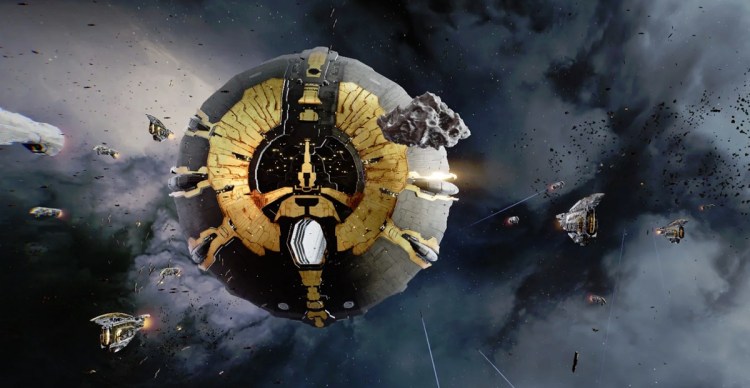testsetset
It’s been seven months since Black Desert Online creator Pearl Abyss of South Korea acquired EVE Online maker CCP Games for $425 million. But Hilmar Veigar Pétursson, CEO of the EVE Online maker for more than 18 years, isn’t taking it easy.
In fact, Pétursson and his team are pushing onward to do bigger and better things.
Last week, CCP and London-based tech startup Hadean hosted a battle with 10,000 spaceships taking part. EVE: Aether Wars was a tech demo, undertaken so that the companies could see just how much the simulation could support. A total of 14,274 ships took part, with more than 3,852 players battling each other. Concurrent combatants peaked at 10,412. 88,988 ships were destroyed.
The event showcased the power of Hadean’s Aether Engine, a distributed simulation engine powered by Microsoft Azure. Over time, Pétursson hopes that the tech will become a routine part of the game. At the Game Developers Conference last week, I talked with Pétursson about the tech demo as well as what it’s like to work with Pearl Abyss.
June 5th: The AI Audit in NYC
Join us next week in NYC to engage with top executive leaders, delving into strategies for auditing AI models to ensure fairness, optimal performance, and ethical compliance across diverse organizations. Secure your attendance for this exclusive invite-only event.
Here’s an edited transcript of our interview.

Above: Hilmar Veigar Pétursson is CEO of CCP Games.
GamesBeat: What’s interesting to talk about right now?
Hilmar Veigar: What we’re doing with Aether Wars, that’s interesting tech. We’re doing a test tomorrow with a U.K. company called Hadean, which makes backend solutions for big simulations. We’ve been working with them on doing a space sim experiment. We’ve gotten 20,000 EVE players to sign up and join it. We’re hoping for 10,000 of them to log in tomorrow and have the biggest fight ever.
We had the biggest fight ever in EVE Online last year, where we had 6,400 people in one internet battle. We’re hoping for 10,000 now. I expect we’ll learn a lot about the capabilities of the technology, some of the things we need to focus on and so on. I’m hopeful that, out of this, we will find, as I call it, the next age of technical evolution for EVE, where we’ll be able to replace the simulation engine underneath EVE Online, which has been running there for 17 or 18 years, since when we first put it together. Obviously it has a lot of compromises from way back when. We were making it for Pentium III dual-processor servers.
GamesBeat: It seems like it’s working well enough?
Pétursson: It’s held up amazingly well, but there’s an end of life for everything. Even though it’s holding up nicely, it’s not well-built for this scenario where thousands of people come together to fight. I think 6,400 is about the limit of what it can handle. We’re hoping that this experiment will provide us with a new path to take.
GamesBeat: I always thought that some of those battles were orchestrated by players. In this case, are you guys pushing them all together?
Pétursson: In this case, yes, we’re pushing them all together for the purposes of the experiment. But a fleet fight in EVE Online is organized by the players. We have very little involvement, other than just doing our best to have the tech work. It takes an amazing amount of social organization to orchestrate something like that. It’s something EVE players have been specializing in for decades. I don’t think anyone else could do it. It’s very much their record, this fight we had last year. We just provide the platform for them.
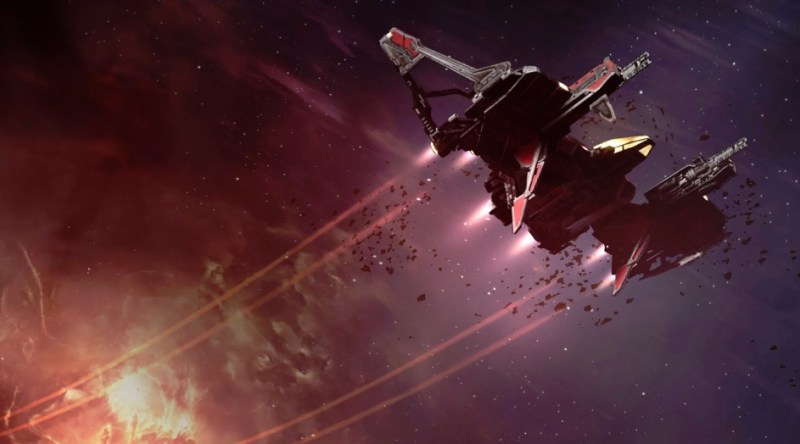
Above: EVE: Aether Wars
GamesBeat: How are you coordinating this test?
Pétursson: We had people sign up and we’ve set a specific time. People can download the client, log in, and go straight into the fight. It’s an all-out deathmatch with very little rhyme and reason to it. You’re just shooting randomly. It’s not really designed to be a game per se. It’s more of a technical test for this backend engine. It’s been a joy to work with Hadean and see if we can break our own record.
GamesBeat: This was built in the days when you still had shards, right? Servers where you had a limit to how many people could be playing together.
Pétursson: Absolutely. EVE was always designed to be single-shard, but obviously behind the scenes, every solar system is a server in a way. That’s kind of the limit. One solar system can run on one CPU. The actual simulation code is single-threaded, which was fine back then. Now we have multi-core computers and much different server architecture than before. It’s a challenge for our old system to benefit from that. This new way of doing things with the Aether engine allows us to harness a lot more of the power of current servers.
GamesBeat: Along the way, did you ever take advantage of something like Amazon Web Services?
Pétursson: A part of the overall infrastructure runs on AWS. Our websites, payment platforms, those kinds of things. But the core simulation largely runs on an architecture we built those decades ago.
GamesBeat: Are you looking to shift over in this age of cloud gaming?
Pétursson: There are many different aspects of what cloud gaming means. It’s often hard to pick a part of what people are referring to when they talk about cloud gaming. What Google announced has more to do with streaming than cloud per se. Most games, in a way, run on some form of a cloud. EVE Online runs on our own servers, but still, it’s in the cloud. The game happens on the backend, not on the client.
A streaming solution like Stadia would benefit EVE. You wouldn’t need the computer. You could play it on a TV. That’s super cool. What we’re doing with Hadean and what Google is doing, it’s two very complementary things. These things combined can allow you to orchestrate some pretty cool stuff. One of the elements of the fleet fights in EVE, the real ones, is that people are interested in getting into them, but if you were to tweet about them — “An EVE fight is going on!” the path to joining it–you have to download the client, create an account, find where the battle is taking place, and so on. I’ve often talked about the concept of deep linking, where if a fleet fight was going on, you could tweet a link, people could press that link, and they could immediately be there.
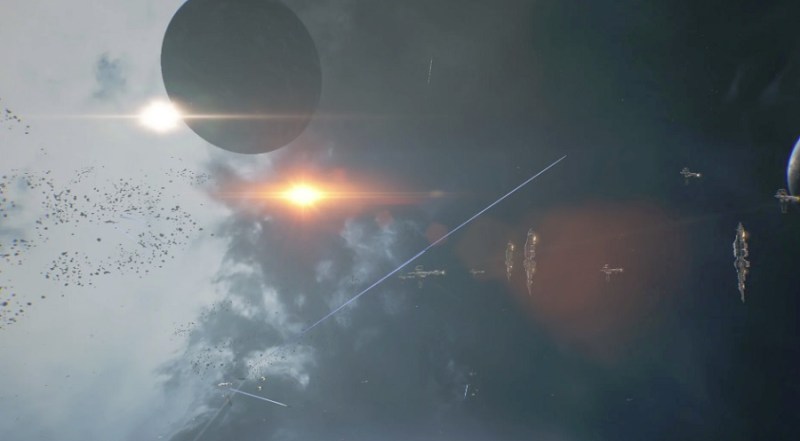
Above: EVE: Aether Wars
GamesBeat: Like they talked about with the YouTube part of this.
Pétursson: Absolutely. Orchestrating something like that–I’m watching a Twitch stream or seeing a Tweet, I could click a link and be right there. I think a lot of people are curious about joining an EVE fleet fight, but they’re daunted by the many, many steps required to get in there. I’ve often fantasized about something like a Hunger Games experience, where you as a viewer could influence what’s going on inside a large fleet fight in EVE Online. That could have a mainstream impact. You’re watching a magnificent space battle happening in EVE Online, and as part of the audience you could send in those little parachutes.
I’ve long had that fascination–how could we allow people to interact with a fleet fight without having to be an EVE player with a spaceship and all that. Having this audience interaction, like you’re endorsing a team and sending them help, boosting them up. I look forward to a time where you could watch 10,000 EVE players playing, and then 100,000 people in the active audience could participate without being in a spaceship fighting.
GamesBeat: Could you also somehow get around any limitation on the number of players?
Pétursson: With the technology evolution we’re testing, the Aether engine, we could potentially get to something like 100,000 players.
GamesBeat: That’s still part of your core simulation software, right?
Pétursson: Yes. If we’re able to pull this off, where we take EVE over to this new way of running the simulation, we could go to 100,000 people as part of the simulation. We could do something like this audience participation thing, but there are limits to what we can scale.
GamesBeat: Could you still, at some point, make use of things like Stadia for that part?
Pétursson: We could absolutely do that. We’d benefit from Stadia even with the old stuff. It’s just the number of people that could participate in it would be limited by the constraints of the simulation engine. If we pull this off with Hadean — or when we pull this off, I say hopefully — with these two things combined, you’ll now have the ingredients for getting 100,000 people to participate in something synchronous like an EVE fleet fight. That would be amazing to pull off.
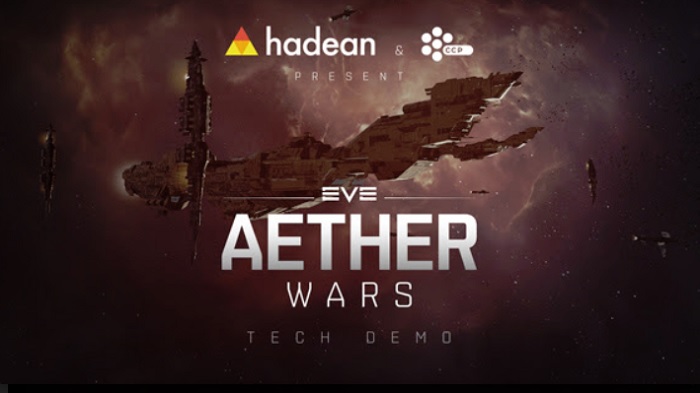
Above: EVE: Aether Wars is a tech demo.
GamesBeat: What else are you finding under the new ownership as far as what you can do?
Pétursson: It’s a big difference, being partnered up with a gaming company as opposed to being financed by investors. It’s just different goals and priorities. Overall it allows us to think more about the long term. We have a much more sophisticated counter-party when we’re discussing company strategy and so on. Pearl Abyss is deeply committed to MMOs. They have their own MMO. There’s just something about talking MMOs with MMO developers. It’s a much more sophisticated dialogue than talking MMOs with investors.
I like working with them a lot, and vice versa. We’re doing a lot of knowledge sharing. We’ve learned a few tricks from EVE over the years, and so have they, being a Korean gaming company. As I often say, Korean gaming companies live in the future, in a way. It’s not just nine hours ahead, or whatever it is from here to there. Korean society and games–they’ve come much further than western societies. Gaming is so integrated into Korean life. I always find it fascinating to learn about what’s going on there.
Over my career, which is now spanning almost 20 years, you’ve been able to look at what’s going on in Korea, and in five years it’s going to happen for us. You take esports, you take free-to-play–you can even look at MMOs in general. Ultima Online and Kingdom of the Winds were kind of at the same time. The role of Lineage in Korean culture is way larger than even what World of Warcraft became in western culture.
GamesBeat: Do you have more resources to start anything new?
Pétursson: Maybe not more resources? It’s more about the long-term thinking. Koreans in general think very much in the long term. That’s why we picked them over many other potentials. There were a lot of people interested in the process we were running last year. We picked them for their depth of MMO long-term thinking. We want to do some deep, meaningful things with EVE, like we’re doing with the simulation engine. This streaming thing is super interesting.
EVE Online is 16 years old. I often say, “EVE Online forever.” I’m only partially kidding. It’s been going for 16 years, and there’s a clear path for another five. There’s a not so unclear path to another 10. That’s pretty cool. I’d say it’s more about attitude than it’s about resources.
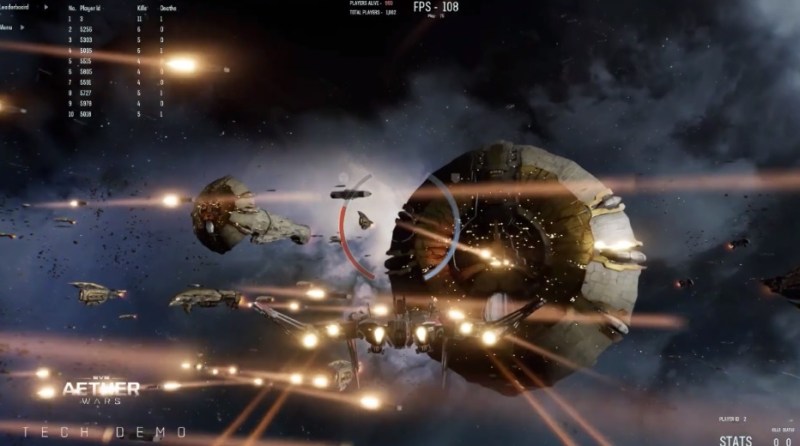
Above: EVE: Aether Wars
GamesBeat: As far as trying to get more players to give EVE a chance, what do you think can be done there?
Pétursson: We need to improve our new player experience. Anyone who’s tried EVE Online knows it could be a little less complicated. [laughs] That’s going to be a big push for us in the coming years. It’s going to take years to improve it. The reason why we want to continue to push there is that we see a lot of people come into the top of our funnel. Hundreds of thousands of people come to our websites who are interested in EVE Online. We’re just not good at onboarding that audience.
There’s something about space and science fiction, especially today–it seems to be growing a lot in popularity. I think it has to do with the fact that space is almost becoming a practical concern. Elon Musk and Jeff Bezos are running for-profit companies to go to space. It’s gone from science fiction to science fact. A space game like EVE Online is much closer to our current reality.
There’s huge research, especially in China. There was a Chinese movie recently, The Wandering Earth, that I saw two weeks ago. It’s a bit like Armageddon, the pace and style of it. It’s a summer blockbuster of a Chinese sci-fi movie, and now it’s the second-biggest non-English movie ever. When you have a country like China setting their eyes on space, I think that’ll wake up America to get back into the space race.
We have the most legendary space MMO ever made. I think there’s a huge opportunity for EVE Online to have a second wind in terms of growth. When you couple in the tech innovation with the simulation engine, fixing the new player experience, streaming–there are just so many opportunities for EVE.
GamesBeat: How do you look at where VR is now?
Pétursson: VR is trotting along. We’re keeping our games going, of course, and we see VR sales spikes very clearly in our data, based on people coming in. There was a pretty big spike in VR device sales over Christmas. That sales spike was bigger than the one for Christmas 2017. The audience is building up slowly. Oculus Quest is a big step. PlayStation VR continues to drive the larger adoption rates. Sony is getting more and more committed to doing more on that front.
It’s still a few years, I think, until we can get back into it, doing the kind of games we’d like to make. We need the market to get maybe two or three times bigger for it to make sense. I believe it will eventually get there. We’re currently in a wait-and-see mode.
GamesBeat: How is your case for some crazy new things? Blockchain is another thing people are talking about.
Pétursson: I’ve been involved in blockchain for over a decade. I’m a bit of a connoisseur of new technologies. That might not shock you. [laughs] I’ve dabbled in it, run nodes, done stuff on several different blockchain projects, worked with various cryptocurrencies for many years.
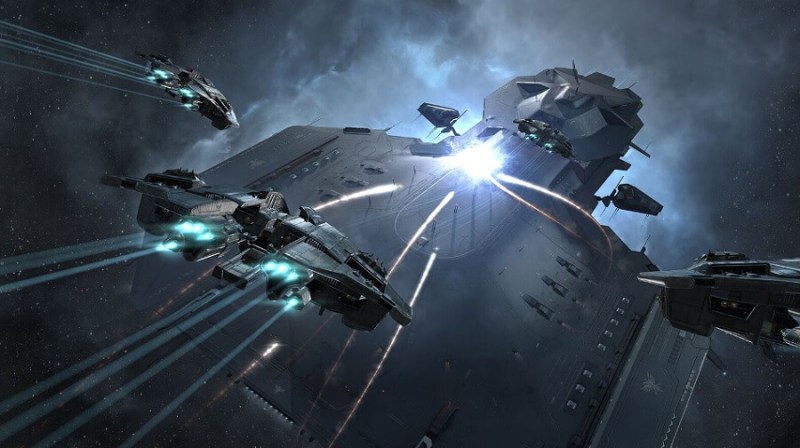
Above: EVE Online
GamesBeat: Are you a crypto billionaire?
Pétursson: No, I’m not a billionaire. [laughs] But when you start early it’s easier to make a profit on it. I haven’t really been doing it for those purposes, though. It’s mainly just keeping up with what’s going on. It’s deeply relevant for something like EVE, which is built around economics. A lot of the elements we manage in EVE Online are what you need to manage in a blockchain economy. Obviously we run EVE as a closed economy. A blockchain is a way for turning something like EVE into more of an open economy.
At some point in time that might be the right thing for us to focus on. It’s years away. What we need to do with EVE right now are way more practical things, like scaling up the fleet fights, fixing the new player experience, getting more mobile access into EVE Online. We’re investing quite a bit into our EVE companion app, which is becoming more and more of a true portal into the EVE universe. These are the things we should be focusing on. But I at least keep an eye on blockchain. That will continue to mature and get more adoption.
The biggest challenge with blockchain stuff is that interfacing with it is not for the mainstream. It’s deeply technical. Getting basic stuff done is quite complicated. Managing your own private key and all these things are cool from a governance and technology perspective, but you have to be deeply technical to trust it and manage it. Of course we have an audience of deeply technical people playing EVE Online, but right now the overlap of EVE players and blockchain enthusiasts–there’s probably some overlap, but it’s too much of a niche of a niche right now. It needs to mature a bit more before something like EVE Online would be a concern.
I looked into it once. I think EVE Online itself is larger than the Ethereum network. Even though blockchain occupies a lot of attention in the media, it isn’t that big. A nerdy little space game from Iceland is bigger than the largest blockchain project.
GamesBeat: The reason I thought it might be interesting is that all the whales go there, the two percent of people who spend all the money in a free-to-play game.
Pétursson: A lot of speculation, market manipulation, understanding all these things–this is what EVE players do all day. Playing the market is a profession in EVE Online. When you marry that with something like a blockchain, then you can elevate the use case of doing that. At some point, the time is right to do that. But it’s still years away. If there’s anything we’ve learned from our VR escapades, it’s that you need to give a bit of time to onboard these innovations before you jump into them.
GamesBeat: Is there anything else to talk about?
Pétursson: There’s also what we’re doing with NetEase. We’re making a mobile version of EVE. I can show you an element from it. This is EVE Online running on a phone, straight gameplay from an iPhone. It’s extremely well done. We’ve been working with NetEase for two years now. You’ll be able to play full-on EVE Online on your phone.
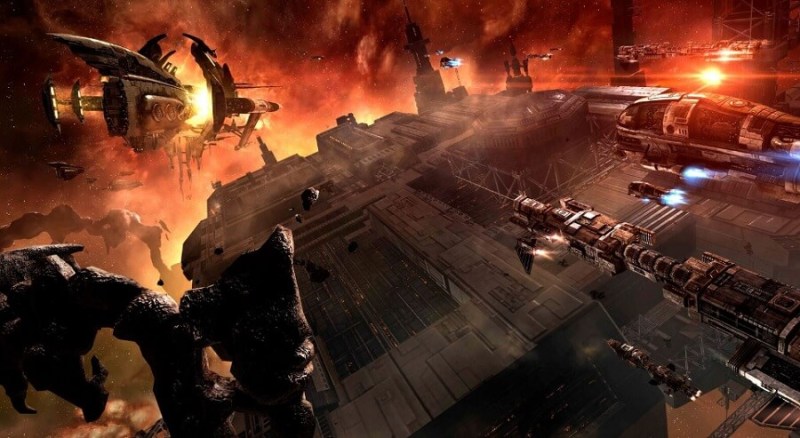
Above: EVE Online
GamesBeat: How is this accomplished?
Pétursson: It’s a complete re-creation of EVE from the first line of code. It’s made in their own engine. I think it’s called the NeoX engine, which we’ve upgraded quite a bit. We’ve helped them with some of the tricks EVE Online uses, to make it work on a phone. People should be able to play it this year. We’re opening up a new world, so this will be a fresh EVE world. There’s an excitement about a new world, a new way to play. We’re focusing on the portal application to interface with the current EVE world.
GamesBeat: Are there difficulties with letting PC players play with mobile players?
Pétursson: No, it’s more like a UI and UX thing. We’ve re-created the interface for mobile devices, and obviously simplified it a lot, because the PC game is very complex. We’re excited to see where this goes. It’s been an absolute joy working with NetEase. They have some phenomenally strong dev teams.
